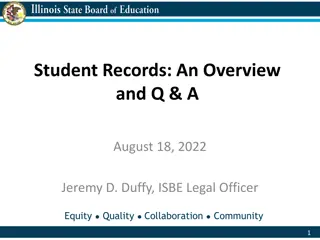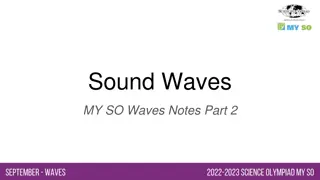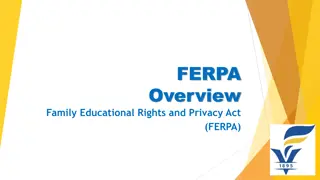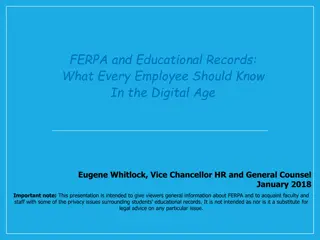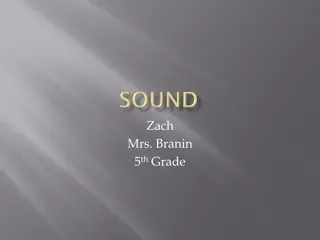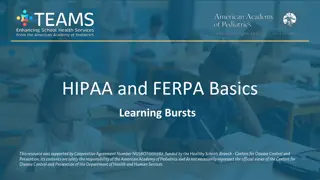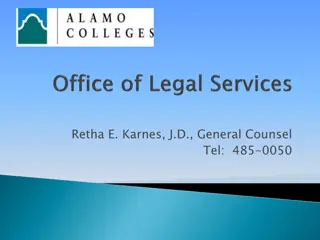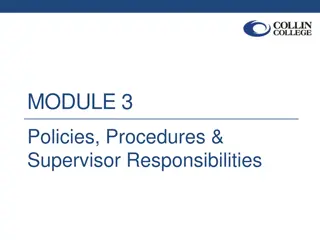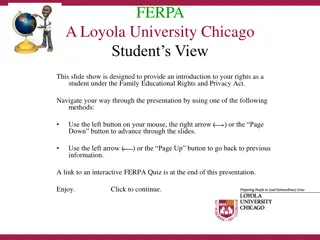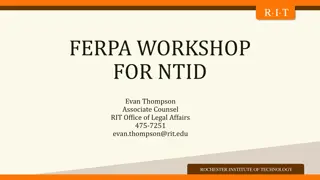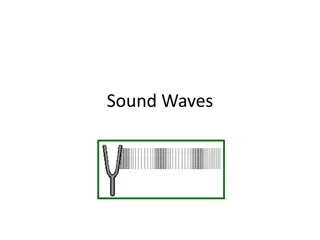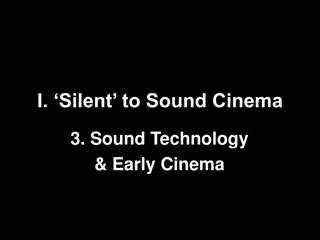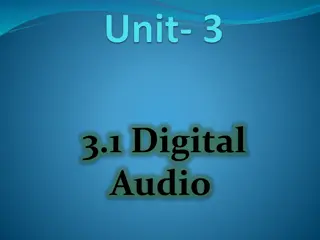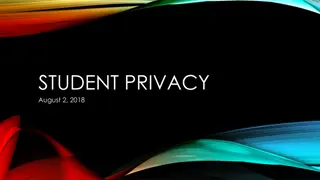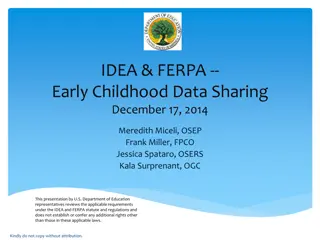Understanding FERPA at University of Puget Sound
This presentation aims to provide an introductory understanding of FERPA (Family Educational Rights and Privacy Act) at the University of Puget Sound. It covers key definitions, terms, scenarios, and the rights students have under FERPA. The goal is to equip participants with the knowledge to handle sensitive information and resources effectively.
Download Presentation

Please find below an Image/Link to download the presentation.
The content on the website is provided AS IS for your information and personal use only. It may not be sold, licensed, or shared on other websites without obtaining consent from the author. Download presentation by click this link. If you encounter any issues during the download, it is possible that the publisher has removed the file from their server.
E N D
Presentation Transcript
Understanding FERPA University of Puget Sound Michael Pastore
Purpose The purpose of this presentation is to provide an introductory level understanding of FERPA. It is my hope that at the conclusion of this presentation that you have a general understanding of the key items, feel comfortable handling sensitive information, and are aware of some resources available if necessary. You can always call.
FERPA Loose Agenda FERPA Basics Key Definitions Key Terms Questions and Scenarios Live your life as a FERPA expert
Basics of FERPA: FERPA SPEAK FERPA exists to provide students with Access to their Records, with certain exceptions Control over access, with exceptions Right to challenge the contents of the record
FERPA Speak: In other words Students get to see what is in their record Right to inspect and review educational records Students decide how the information is shared and with whom Right to control disclosure of information from educational records Students can dispute what is in the record Right to seek amendment to incorrect educational records
What is FERPA? A. The Federal Education Records Protection Act B. The Family Educational Records Privacy Act C. The Family Educational Rights and Privacy Act D. The Federal Educational Records and Protection Act
Who is Responsible for FERPA? Everyone and the Registrar Anyone with access to student records Financial Aid Business Office University Counsel Athletics Student Affairs Faculty
Who Has FERPA Rights All students attending an institution of higher education receiving federal Title IV funds, regardless of age All students for whom records are maintained, regardless of method Parents lose rights when student is in attendance, regardless of age Students retain all FERPA rights until deceased
Should you share that information? Ask yourself the W questions: Why am I being asked to release student data? Who is asking? What student release is needed? What determines that this is a student record? What is the record being requested? Where is this student record going? Where do I need to record that it was released?
Every Year: Annual Notification Requirement Right and method to inspect and review Right and method to seek amendment Right to consent Other than 99.31 exceptions Right to file a complaint with the Department of Education Definition of legitimate educational interest/school officials Directory information Defined by institution
Student Request to Release Should include: Record(s) to be released To Whom Purpose Can be: Submitted to the institution Shared with a third party Electronic signature
Just Don't Do It and Call Me Do not release the following information: Social Security Number Citizenship Gender Ethnicity Religious preference Grades GPA Daily class schedule Except to the student or anyone with a Legitimate Educational Interest
More FERPA Speak: Terms Student Student Record Any information or data recorded in any medium Educational Record Any information directly related to a student, maintained by an educational agency or institution Directory Information Student info that would not be harmful if disclosed School Official Member of an institution acting in a student s educational interest, limits on need to know Anyone attending your institution, of any age
What is a Student? In attendance Institutionally defined All students for whom records are maintained, regardless of method Rights begin when in attendance regardless of age Parents/Guardians lose right at 18 or when attending Acquire all FERPA rights when a student at Higher ed Institution.
What Can I Share: Directory Information Name and Current Enrollment Address, Telephone Number, and Email Address Not residence hall address Date and place of birth, dates of attendance, class standing, previous institution(s) attended, major field of study, awards, honors (including Dean's List), degree(s) conferred (including dates), full-time or part-time status. Past and present participation in officially recognized sports and activities, physical factors (height, weight of athletes) and photograph.
Confidentiality Students may request to not disclose directory information by completed a Request to Restrict Directory Information form with the Registrar s Office How do you check for a request for confidentiality? If you can see the Person Information screen, there will be a red box that says Do Not Release Records If you don t know how to check for this you should not release directory information You do not have to release directory information. The rule for sharing directory information says you can, but that does not mean you have to or should.
Is Everything an Educational Record? The following are not educational records: Law enforcement records* Treatment/medical records* Alumni records information collected after departure, education records are still covered under FERPA Employment records (unless job is for a student only) Sole possession records* * Once these records are shared with School Officials they become educational records
Who Can We Release Records to? To school officials who have a legitimate educational interest in the records We will talk about that in a few To officials of another school, upon request, in which a student seeks or intends to enroll. To certain officials of the U.S. Department of Education, the Comptroller General, and state and local educational authorities, in connection with certain state or federally supported education programs. In connection with a student's request for or receipt of financial aid, as necessary to determine the eligibility, amount, or conditions of the financial aid, or to enforce the terms and conditions of the aid. If required by a state law requiring disclosure that was adopted before November 19, 1974. To organizations conducting certain studies for or on behalf of the university. To accrediting organizations to carry out their functions. To parents who claim the student as a dependent for income tax purposes. To comply with a judicial order or a lawfully issued subpoena. To appropriate parties in a health or safety emergency. To an alleged victim of any crime of violence or sexual harassment offense of the results of any institutional disciplinary proceeding against the alleged perpetrator with respect to that crime or offense
Who are School Officials? A school official is: A person employed by the university in an administrative, supervisory, academic, research, or staff position; A person elected to the Board of Trustees; A person employed by or under contract to the university to perform a special task, such as legal counsel or an auditor; A student serving on an official committee, such as a disciplinary or grievance committee, or assisting another school official in performing his or her task.
What is Legitimate Educational Interest? A school official has a legitimate educational interest if the official needs to review an education record in order to fulfill their task. Examples include: Performing a task that is specific in their job description or by a contract agreement; or Performing a task related to a student's education; or Performing a task related to the discipline of a student; or Providing a service or benefit relating to the student or student's family, such as health care, counseling, job placement, or financial aid.
When in Doubt Don t give it out Is the request about an Educational Record? Student? Is a signature required? Must vs. may: do I have to release? Is the requestor a school official, do they provide a service to the institution? Need to know: Is the requested information job-related? Is this directory information? Confidentiality Request? Institutional policies and procedures. You may have access to information but it may not be your within the scope of your department or job to release it.
Questions? If you have any questions about the FERPA policy and how it relates to your job you can contact the Registrar s Office. By phone 253.879.3217 By email registar@pugetsound.edu The office is located in Jones Hall, room 013


